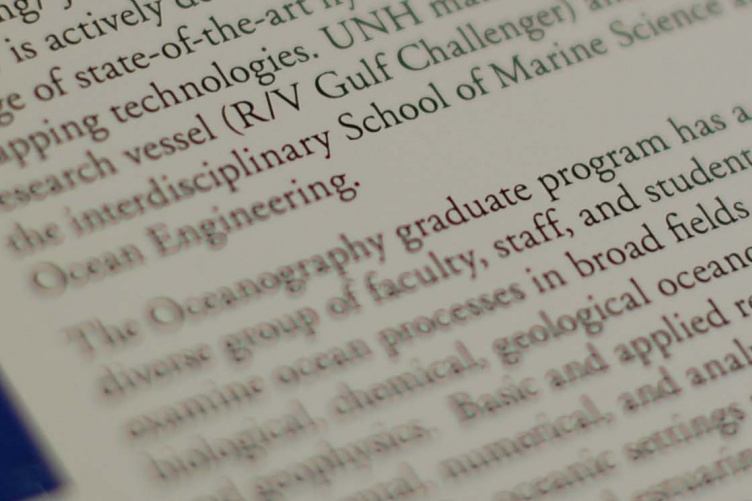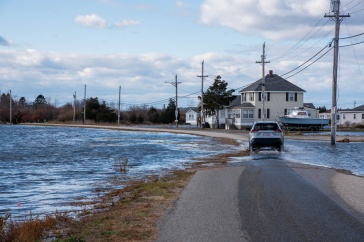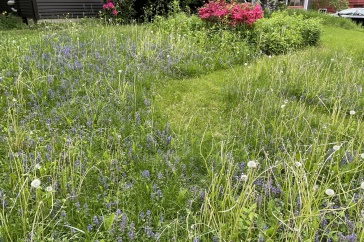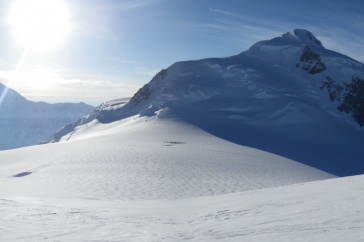
How do you set yourself apart from the crowd while also pursuing your passion? Undergraduates at UNH are finding that answer resides in scientific research — specifically, leading their own research project and publishing the data and results, sometimes before they even graduate.
For many budding scientists, their first foray into conducting and publishing research comes during graduate school. The phrase “publish or perish” is not completely tongue-in-cheek; it speaks to the weight that peer-reviewed published research carries and its importance in the careers of scientists. Particular emphasis is placed on the person whose name comes first in the list of authors of these manuscripts. Generally speaking, the first author is the one who spearheads the research responsibilities and takes on most of the writing and editing duties.
Balancing a full course load while conducting and publishing research is not for the faint of heart. Persistence and self-motivation are key characteristics in many of the students who choose to pursue this route, as revealed by the following three individuals with ties to UNH who have first-authored published research they conducted while undergraduates.
Opening the door to future opportunities
Tristan Amaral ’15 majored in Earth science with a focus on climate, and he was interested in gaining some research experience outside the classroom. He reached out to scientists at the UNH Earth Systems Research Center (ESRC) to discuss some options, and that led to his involvement with the CoCoRAHS Albedo project, a citizen science program aimed at measuring and mapping precipitation data and the reflection of sunlight off surfaces like snow. Amaral not only helped to collect snow albedo measurements, but he also managed the program and was responsible for analyzing the data. This formed the basis for his research, which he twice presented at the UNH Undergraduate Research Conference and culminated in a scientific paper he wrote based on the research results.
“My time with the ESRC was really influential in my career and helped to steer me in the direction of scientific research,” Amaral says. “Being able to actually conduct research as an undergraduate and learn about how the process worked offered an important opportunity to learn skills that I then applied as a researcher after I graduated.”

The process was challenging, he says, because the skills needed to conduct research and present the results are not always taught in undergraduate classes. “So you really have to start at step one: how to collect and process the data, how to make scientific figures, how to write and organize a scientific paper — those skills are not usually taught to undergraduates,” Amaral explains.
He admitted that it was difficult to find the time to balance his course load with writing the manuscript, which he started while still at UNH and then finished up after graduation. He credits this experience for helping to open doors for his next career steps.
“I think my research with ESRC was instrumental for getting into grad school,” he says. “I had good grades and experiences, but being able to show that I had first-authored a paper and had conducted research for a couple of years was really helpful in getting me into all the schools I applied to, and I even received a couple of scholarship offers.”
Amaral’s advisors on this project — including UNH researchers Cameron Wake, Jack Dibb, Elizabeth Burakowski, and Mary Stampone, who were also co-authors on the paper — provided him with a balance of support and space so he could work through the process successfully.
“They had a vision in seeing this through, and they were very patient and helpful in getting me there,” he says.
A Career-Changing Experience
Lily Zhao was an undergraduate at the University of Chicago in 2012 when she heard about UNH’s Northern Ecosystems Research for Undergraduates (NERU) Program, which was led by researcher Ruth Varner of the ESRC. She says she was drawn to the NERU Program because the experience allows students to explore their interests entirely and gives them the resources and mentoring needed to succeed. Zhao was accepted into the program and traveled to northern Sweden that summer to study reindeer biology and learn about the traditional reindeer herding practices of the indigenous Sami people, which cultivated her passion for both ecology and social science.

This led to a deeper dive into studying reindeer diets, which became her senior honors thesis project at the University of Chicago. That research was published in the journal Polar Biology, together with international collaborators and her NERU advisor Erik Hobbie of the ESRC.
Currently a Ph.D. candidate at the University of California, Santa Barbara, Zhao credits the UNH NERU Program for changing the trajectory her career. “The experience was life-changing,” she says. “It was the first research opportunity I ever had, I didn’t have any experience before that. I thought it would be great to be a scientist but I didn’t fully know what that meant — I had an inkling, but I didn’t truly know until I went through this process myself.”
Zhao offers some advice for undergraduates who are considering getting involved in research. “You need to be persistent even if you don’t get a response from a professor first,” she says. “Join their lab and ask to do your own project rather than only working the faculty member's projects; faculty and researchers are really receptive to that can lead to lifelong mentorship relationships.”
The Launchpad for Growth
Ella Cedarholm ’19, a Lee, N.H. native, is passionate about the ocean. “I always knew I wanted to incorporate the sea into my career path,” she says, noting that she’s majoring in Earth sciences with a concentration in oceanography. Cedarholm applied to work in the Ocean Process Analysis Lab (OPAL) as a freshman where she helped to collect and test water samples from the Gulf of Maine and around the world; she’s been working at the lab and occasionally on the R/V Gulf Challenger almost every semester since then, with Joe Salisbury and Chris Hunt as her lab supervisors.

Last spring, she participated in a SEA Semester Study Abroad Program, where she spent six weeks aboard a ship sailing from New Zealand to Tahiti while conducting her first research project studying the latitudinal shift of the southern Subtropical Front. Cedarholm went on to conduct research at the Woods Hole Oceanographic Institution in their physical oceanography department last summer. She used computer models to investigate how the Pacific western boundary current acted as a barrier to southern transport of contaminants from Japan’s Fukushima disaster. This study formed the basis for her research paper, which will be published in Geophysical Research Letters this spring.
Cedarholm recommends that undergraduates who are interested in conducting research should get involved before their senior year. “My work study at OPAL opened doors for me to go out to sea and work on other research projects,” she says. “Being able to tell prospective employers that I’ve worked in a lab for three years gives me an advantage over other applicants. And having computer programming experience is helpful and important for any research project, regardless of the topic.”
She admits that it’s tough to balance school work with her research, but outwardly she seems to be handling it with aplomb.
“As the first author of the paper, I conducted the majority of the data analyses and now I prepare the agenda for all the weekly meetings with my advisors to discuss the edits needed to publish the paper,” she says. “I’m taking a full course load of classes this semester, and I still work at the OPAL lab on Fridays.” She grins. “But I’ve always had a strong work ethic, and by the time I graduate, I’ll have first-authored a paper,” she adds proudly.
The Institute for the Study of Earth, Oceans, and Space (EOS) is UNH’s largest research enterprise, comprising five centers with a focus on interdisciplinary, high-impact research on Earth and climate systems, space science, the marine environment and seafloor mapping. With more than $43 million in external funding secured annually, EOS fosters an intellectual and scientific environment that advances visionary scholarship and leadership in world-class research and graduate education.
-
Written By:
Rebecca Irelan | Institute for the Study of Earth, Oceans, and Space | rebecca.irelan@unh.edu | 603-862-0990



















































